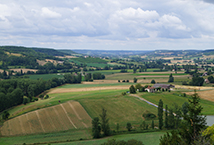- Home
- ESEC SCOPE
- Publications
- The agroecological transition : challenges and key issues
The agroecological transition : challenges and key issues
Visuel

Type of text :
Opinion and report
Type of referral :
Government referral
Working group :
Section for Agriculture, Fisheries and Food
Date d'adoption
Date adopted : 11/23/2016
Rapporteur(s) :
Photo

Cécile CLAVEIROLE
Qualified individual
Overview
Présentation
Since French agriculture is part of a globalised system, at a time when certain markets are undergoing deregulation it must get to grips with a range of significant challenges: to do with food, health, the environment, the economy, social rights and society, territories and techniques. The Prime Minister asked the ESEC about how agroecological production systems might be able to respond to these challenges.
As a scientific discipline spanning both agronomics and ecology, agroecology does not just aim to transform agriculture but also to review food systems as a whole with a view to making them more sustainable. It combines agricultural production and reproduction of natural resources, and has both territorial and global implications. It could be described as a system of interactions between the stakeholders involved in running farms, sectors and natural resources.
Agroecology helps to make soils more fertile, can increase the agronomic yields of farms, cut their costs and thereby shore up their independence and resilience. It can also improve the living conditions of farmers and employees and play a part in boosting the appeal and value of their occupation. For consumers and citizens, it must provide healthier and more nutritional food, all the while protecting biodiversity and landscapes. It can also help to create jobs and fight back against the rural exodus.